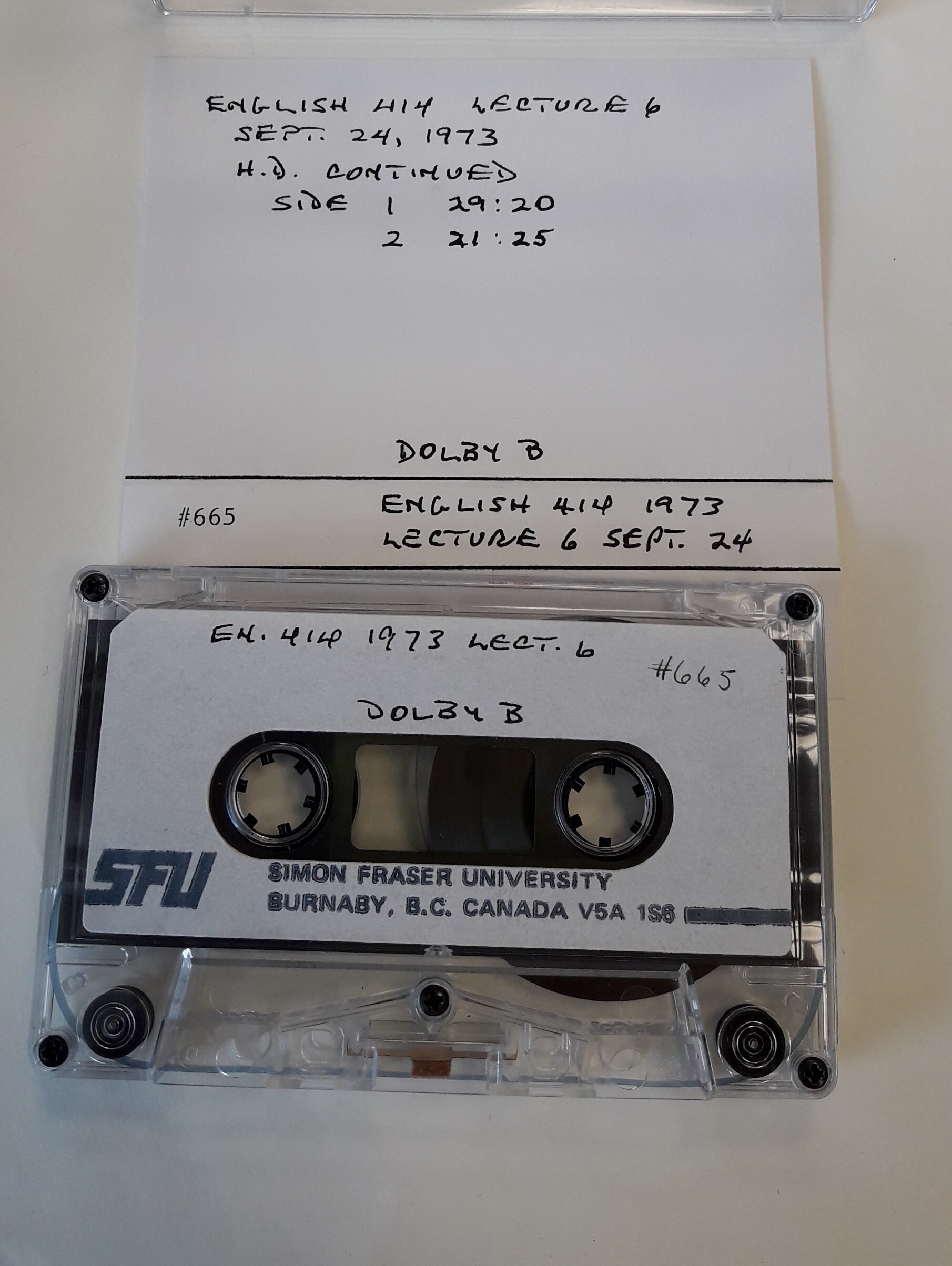CLASSIFICATION
Swallow ID:
5773
Partner Institution:
Simon Fraser University
Source Collection Title:
Reading in BC Collection
Source Collection ID:
MsC 199
Source Collection Description:
Reading in BC collection was assembled during the late 1970s and ‘80s. There are approximately 1000 tapes in this collection. It consists of the recordings of Canadian and American writers, mostly poets, reading poems, talking, being interviewed, participating in panel discussions, and so on. Most of the recordings were made in BC, but there are some made elsewhere in Canada or the USA. Quite a few of these recordings are unique copies, not to be found elsewhere.
Source Collection Contributing Unit:
SFU Library
ITEM DESCRIPTION
Title:
George Bowering English 414 Lecture 6 at SFU on September 24, 1973 #665
Title Source:
cassette and j-card
Title Note:
On J-card: English 414 Lecture 6 Sept. 24, 1973; H.D. continued
Language:
English
Production Context:
Classroom recording
Rights
Rights:
Copyright Not Evaluated (CNE)
CREATORS
Name:
Bowering, George
Dates:
1935-
Role:
Speaker
MATERIAL DESCRIPTION
Image:

Recording Type:
Analogue
AV Type:
Audio
Material Designation:
Cassette
Physical Composition:
Magnetic Tape
Extent:
1/8 inch
Sound Quality:
Excellent
Physical Condition:
Excellent
Other Physical Description:
Black and white clear jewel case with J-card
DIGITAL FILE DESCRIPTION
Channel Field:
Stereo
Sample Rate:
44.1 kHz
Duration:
T00:31:39
Size:
39.3 MB
Bitrate:
32 bit
Encoding:
WAV for master files and .MP3 for online files
Channel Field:
Stereo
Sample Rate:
44.1 kHz
Duration:
T00:30:26
Size:
36.2 MB
Bitrate:
32 bit
Encoding:
WAV for master files and .MP3 for online files
Dates
Date:
1973-09-24
Type:
Performance Date
Source:
J-card
LOCATION
Address:
8888 University Dr, Burnaby, BC V5A 1S6
Venue:
Simon Fraser University
Latitude:
49.2784
Longitude:
-122.9231
CONTENT
Contents:
Side
Track
No.
Comments
One
0000
0024
Lecture begins
0037
Mentions Harold Watts essay “H.D. and the Age of Myth” in Sewanee Review LVI Apr. 1948, and some dictionaries of myth (e.g. Classic Myths)
0062
Discusses H.D.’s admiration for hard, elemental strength/courage in relation to “The Sea Rose”
0074
‘Rhyme and reason’ and the cult of mass communication
0087
“Words are not counters or tools… (They) are manifestations of a world we enter not as users or owners but, at the very most, equals to”
0099
“The qualities of words that can’t be described as things that we can own, explain or interpret,” in relation to “The Sea Rose”
0145
Mentions “A Sea Lily”
0159
Psychological and aesthetic ramifications. Poems might be made to survive by their singularity
0175
Briefly looks at “North Star”
0188
The connection between beauty and (the sustenance of) life. The only worthwhile beauty, for H.D., is assertive of life and survival versus decadence. Discusses in relation to the goddesses that H.D. admires (esp. Artemis who is inviolable as well, Athena, Demeter, Circe)
0241
In “The Walls do not Fall” she becomes ISIS, Classicist aesthetics are concerned with the strength and survival of that which is beautiful; that which is beautiful is seen as that which lasts
0252
Looks at poem about Athena “Pallas”, an introductory poem. “They” in the poem refers to men
0262
Reads out a passage. Athena is simultaneously the goddess; protector; example and at the same time, Greece (Athens) and women
0296
Discusses the end-rhyme in the poem
0302
“What are the rhymes making you do?” asks Bowering. “This is the angle to attack the poem on.” Uses of rhyme are subtle. They don’t discard real speech patterns
0332
Don’t think that H.D. was just an anti-male amazon
0347
Another aspect of the “War Trilogy” that must be kept in mind. One does not reach ‘The Mystery’ by abstractions but by sharp detail. Mentions “the scribe”. H.D. places herself philosophically against the Aristotelian genus sorting. She wants to portray how things come together, “wildly dissimilar yet actuated by the same fear the hippopotamus and the wild deer hide by the same river…”
0365
She is against associating things in that organization “that places everything in boxes”. George discusses the scientific objectification of the world and its relation to capitalistic exploitation
0408
Looks at two more poems that connect to “The Walls do not Fall” whose theme is: What do we do with language?
0413
After the work of the poet has been done the mysteries remain
0427
The mysteries are not explained away as is so common in the 20th Century where mystery gets changed into a puzzle – something solvable (i.e. poems of Tate, Ransom, etc.)
[0042]
“The Moon in your Hands” is discussed
0460
“The Good Friend” is discussed. A poem about poetry of the Elizabethans and her own – similarities between Elizabethans and moderns. Introduces “War Trilogy” and “Walls do not Fall”
0514
Greece is not the metaphor in “The Walls do not Fall”. All the sources of magic, religion, myth (i.e. Christian, Hebraic, Egyptian, Theban and the secret, hermetic forbidden) are there
0550
Sense that she takes structures from Christianity and extends them so that they will take all the beginnings of myth and religion. The Holy Ghost becomes dreams. We admit the transubstantiation
0578
H.D. makes association between rhymes, images and between gods that nobody ever made before because she makes them purely on the basis of sound. Necromancy
0597
H.D. wants to make the “associations of delight” in terms of rhyme. She doesn’t see mystery as a puzzle (i.e. something that is outside of us that we can solve)
0619
H.D. doesn’t want any frills or ‘poetic devices’ for the war in terms of the use of the language. She wants to show the continuation of the spirit despite the mechanical horrors of war. This is discussed at some length
0741
“Inspiration stalks us through gloom” (stalks us unaware as Coleridge said)
0750
Quotes Joseph Riddle. “H.D. is like Helen in that she is captive at her loom within the sacred space of the walls (i.e. in Troy) which both protect her and hold her captive”
0765
Lecture ends
0771
End of Side One
Side Two is blank
Notes:
SFU BC Readings formatting

